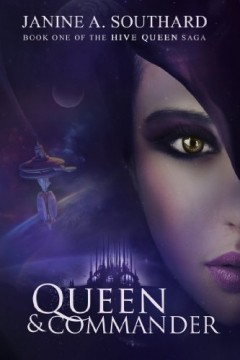Debut author Janine Southard has come out with Queen & Commander. It is the first book in what is planned to be a series for young adults. A science fiction tale, its focus on relationships brings what some might consider a feminine touch to the only fiction genre with more male than female readers. I found it to be an enjoyable read, even if it was aimed at an audience younger than I.
The story starts on a colony world in “Welsh space.” In this world, students are tested and assigned to positions in society based on their results. The highest position is attainable only by women — that of queen. A queen is roughly the equivalent of a naval captain or admiral. She takes command of a space vessel whose all-male crew pledges eternal devotion to her, in return for which she is duty-bound to them.
One online reviewer referred to this as a “fantastic feminist angle.” I find this odd, since feminists invariably swear that feminism is about equality, which would make it an antifeminist angle. Perhaps someone has slipped and given the game away?
At any rate, Rhiannon, the main character, is given the task of being queen and commander. Her best friend is distraught over the prospect of being separated from her true love after graduation. They turn to Rhiannon to help keep them together, and Rhiannon, though she feels a foreboding, cannot deny her best friend anything. In order to help them, she takes them both on as part of her crew, despite the fact that no other woman can serve under a queen (the excuse being that the presence of another female could sow discord and distract the men from their devotion).
She eventually assembles, by means not entirely on the straight and narrow, a crew of inexperienced yet talented individuals and is awarded command of the spaceship Ceridwen’s Cauldron. They set out to seek adventure and turn a profit, but when a government official discovers their illicit arrangement, he blackmails them into performing a task for him.
I am well known for breaking out into a rash when I come into contact with feminism. By this I am not referring to the noble rationale given for feminism, but rather feminism as it is actually practiced. I had no such trouble with Queen and Commander. Southard has created several believable, differentiated, and interesting male characters, none of whom she mistreats. Rhiannon’s high intellect has given her a superior position in a society that is at least somewhat sexist, but the author never validates this superior position by portraying women as superior people. Indeed, Rhiannon herself is rivaled intellectually by one or two of the men serving under her. At least one of them brings a foreigner’s perspective and amused disdain for the Welsh matriarchy.
What I would have appreciated, however, was a bit more information on the society and how it came to be as it is. Serving in space are a lot of males and very few females. What portion of society serves in space? Does this create a glut of females back home in civilian society? How is this handled? And how did such a practice come to be? What economic necessity, sexist ideology, or religious belief drove it? The answers to these would not only flesh out the world, they might provide plot points for future stories.
I also found it odd how devoted the males were. A crew that loses its queen slowly goes crazy. In a book that is otherwise purely scientific — even going so far as to use Alcubierre Drives — this smelled a little like fantasy. Not that it does not work in the story, but a little explanation for why this was so would be helpful. Are male crew members subject to some psychological manipulation? Why would they become so zealous about their queen as to be incapable of functioning well without her?

The prose is generally smooth, though there were a handful of metaphors that took me out of the story. They could be omitted to good effect. I appreciated how in tune with her characters the author was, and therefore how in tune we eventually become. Each chapter has its own POV character, and we read their thoughts and learn their feelings and get to know them well.
It is a short book, and I could have hoped for a bit more story. Being the first in a series, one supposes that there is a lot of story to come and that if there is not a fully fleshed out first, second, and third act it is for this reason. Still, right now the story stands alone and I felt like I wanted more when I turned that last page.
Wanting more, however, is probably what the author was going for, and she got it. The story is fun, short but not too fast, and occurs in a unique world. Not too much is explored but there will be time for more. The yearning of the young graduates to go their own way by their own rules is something any libertarian will appreciate too. It is definitely worth a read; and since this was Southard’s first book, I expect the next will be even better.
















Comments on this entry are closed.
Mike July 18, 2013 @ 12:17 pm | Link
The stuff about the Queen and her devoted all-male crew who slowly go mad if she’s not around reminds me a little of the Syreen from the classic video game Star Control.